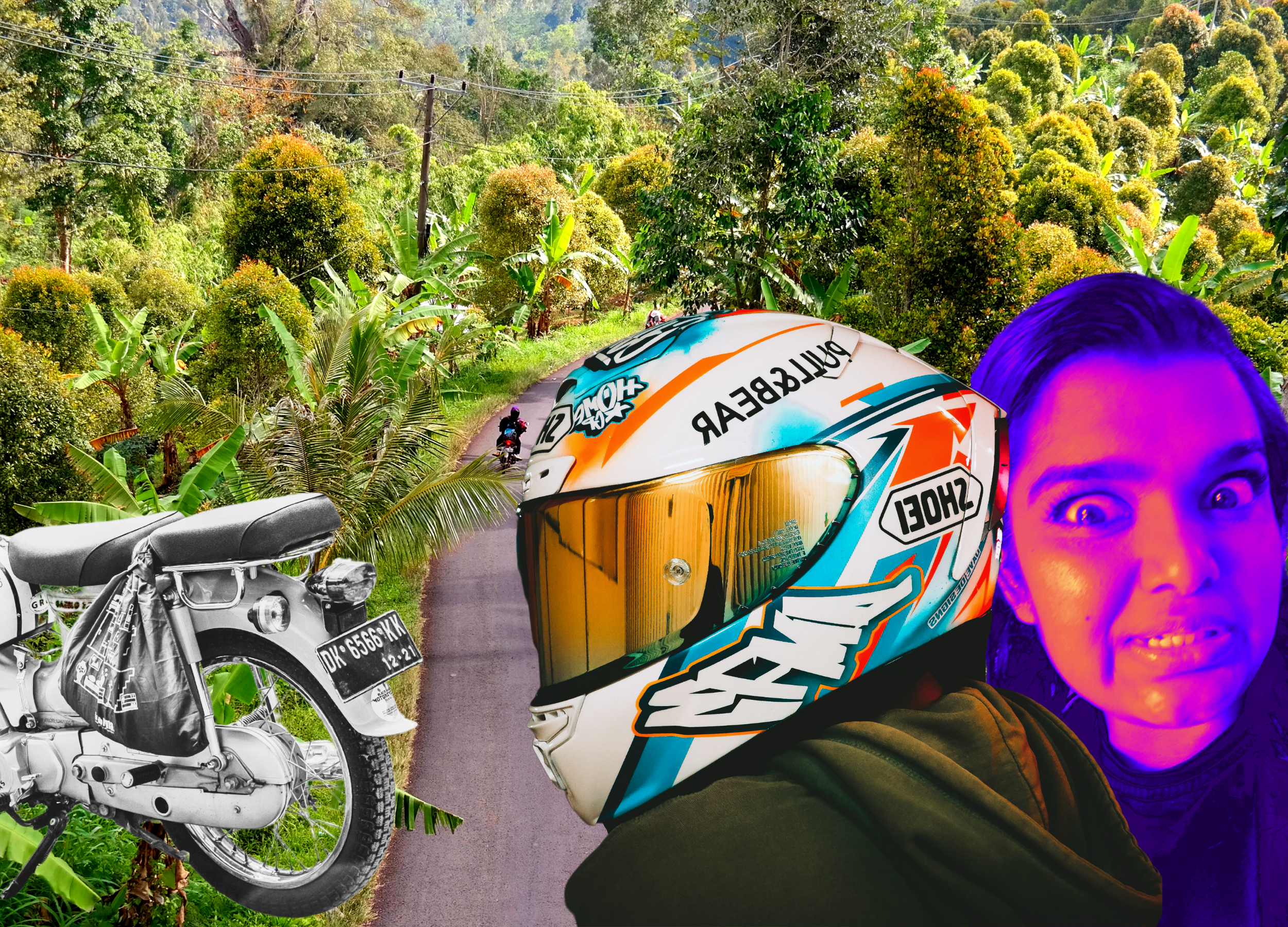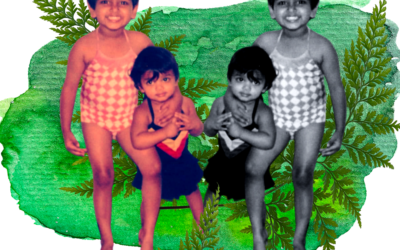“Do you have a helmet?”
I’m standing at the corner of what is normally a very busy street in Ubud. Now, it is empty. Darkness envelops me. In the distance, I can see coconut trees swaying and the golden rooftops of pointed temples gleaming.
I’m looking desperately into the eyes of a man who has arrived on a motorbike to take me home. Asking him if he has an extra helmet for me to wear.
“Pak….kamu punya helmet?” I repeat.
He shakes his head.
“Tidak, helmet?”
I ask him again as if my question is going to elicit a different response. He is patient and at the same time, he is a bit rushed. Homedelivery mobile apps like Gjoek and Grab (Indonesian versions of Uber and Lyft) are banned. If members of the local Banjar find out, it could turn violent. I know this. And still, I‘m hesitant to jump onto the motorbike.
I’ve been riding my own scooter in Asia for a while now. I have seen for myself the very fatal implications of not wearing a helmet. I’ve made a personal promise to myself. I’m not going to get a scooter unless I have a helmet on.
And still, here we are. I look around me. I know at this hour it is going to be hard to find another bike. So, I get on.
Fuck it. Let’s enjoy it.
Initially, I’m gripping the corners of my seat. Tense. Rigid. And then, I feel the cool breeze on my face. I realize – I’m now on a bike without a helmet. AND – this isn’t any scooter. It is a Yamaha NMax. Huge. Powerful. I click my head to the right and the left. My soul screams out. Fuck it. Let’s enjoy it.
Why not? Right?
I lean back a little. I release my hair from the band which was holding it all together. Now, my mane is fanning out like a dense fibrous unruly ocean at high tide. We go through tiny alleyways and hilly back roads. As we pick up the pace, my hair seems to take on an energy of its own.
What is the point of sitting on the seat, rigid with terror? Fearing every turn as if somehow my energy alone has prevented an accident? Orienting towards pleasure as Adrienne Maree Brown puts it, is a far more enjoyable way to live.
*
Why should we unpack safety protocols?
As I travel through the world I recognize the difference in cultures, perspectives, and value systems. At first, I assumed we all have a universal understanding of the word: safety. The more I move through our world, the more I realize that isn’t the case.
Access to resources determines how many guardrails a society can erect. And still – there is something deeper at play. Unpacking the cultural importance of safety is so important. Why? We begin to shine a light on our unconscious beliefs around life, death, and control. How much we can ‘protect’ ourselves from danger, sickness and death… have dire implications for how much money we think we need and how we walk through the world.
Those classes of society with a strong focus on physical safety have a lot to teach us about the benefits and limitations of security. And those other classes of society with six children and two chickens on a motorbike, have plenty to teach us on the extent of faith and trust. Both attitudes have their merits and shortcomings.
While I lean more towards surrender as a life philosophy – I learn more and more as time goes by. Here are a few stories on this issue.
*
California Safety Drill!
Rhea, my sister, like me is a by-product of India and the Middle East. Our sense of safety is considerably different from Western consciousness. When she came to study and work in California – she tickled us silly with this story.
Rhea’s sitting at her desk. She works at the university campus recreation center. This is a massive brilliant facility with hundreds of students and student employees. When, all at once, she sees her co-worker walking in – red in the face. The co-worker is furious.
“We have to shut the facility down. Now!
We need all the students out. NOW!”
Why? Over the weekend, maintenance had come in to replace the fire extinguishers. They had taken out the old ones…but they hadn’t replaced it. The co-worker has realized the whole building was extinguisher-less.
This means, in the case of a fire – there would be no extinguisher! Safety hazard. Her co-worker is very coolly and methodically doing what she needed to do to get everyone out of the gym, lockers rooms, and tennis courts.
A little surprised, Rhea made a mental note and continued with her work.
“What are you doing?!”
Her co-worker was staring right into her eyes. “I thought I told you we need to vacate the building?!”
“Oh, the staff too?” asked Rhea.
*
Thousands of miles away, my father and I are laughing. We are sitting in front of a laptop listening to Rhea relay this story.
Even the staff?!
The laughter fades off. My father and I start shaking our heads. To us, this evacuation seemed so extreme. While I understood the context, I thought the co-worker was overreacting.
We laughed at Rhea’s reaction too. Why? Would something like this ever happen in Dubai or India? Would a business shut down the entire facility because their fire extinguishers needed replacement? Erm… it feels a little hard to believe. Even if management decided to evacuate the building…I could almost hear the instruction:
“Get the customer out. Everyone else. Keep working.”
Later, I mentioned this fire-extinguisher story to an American friend. She was waiting for the punchline. She was unfazed: That was the way to run safety protocols.
That was the moment when I realized… oh! Could this be a cultural thing?
*
…More like SAFETY THIRD
Rhea and I often have a good laugh about her work experiences in California. She told me about how a safety-conscious co-worker was dissatisfied with the safety protocols in his workplace. He felt that the organization didn’t have a ‘Safety First’ attitude.
So, he printed out stickers with the words:
“SAFETY THIRD”
He placed the stickers all over his department. Why? He wanted everyone to know that their safety isn’t the number one priority. Erm, what? Passive-aggressive and morally superior much?
*
How do you protect yourself from fire extinguishers?
For most of my life, I lived in a one-bedroom apartment with my entire family in Dubai, UAE. Space was limited…and not just in the apartment. There weren’t parks or playgrounds for the kids. So, inevitably – the children in my building took to the corridors of the apartments to play. The corridors were close enough for the mothers to keep an eye on us…while still allowing us more space to collectively play.
The kids took their little pink and blue bicycles into the corridor for an afternoon of play. On broken mismatched tiles, we would cycle up and down the corridor. Over and over again. Picking up speed. Trying to avoid bumping each other or the residents trying to get in or out of their apartments.
As children were regularly cycling in the corridor, one of the parents spotted a safety hazard: the two fire extinguishers mounted on the wall.
These two fire extinguishers were an accident waiting to happen. A child could lose control of their bicycle and hit them on the fire extinguisher or worse.
And so, the only solution was to cover the fire extinguisher with enough padding that any impact wouldn’t result in a child going to the hospital. For as long as I can remember, the fire extinguishers were wrapped with large padded pillowcases. The pillowcases were held in place with rope and duct tape. So securely had the fire extinguishers been secured…I never saw them without the trusty pillowcases.
Safety first.
Mastering Mortality & Meritocracy.
Living in America has opened my eyes. I see so many benefits to this safety-first consciousness. And at the same time. I find myself wondering – why? Why is there this much focus on supplies, backups and safety procedures? At what point does safety consciousness turn into abject fear? At what point does it transcend into a greater disproportionate belief in your power, your control and your ability to master mortality?
We need to ask the question – does this make sense? At what point has common sense flown out of the window in the name of being ‘safety first?’. As an outsider to North American consciousness – I have a few opinions. I wonder at the need for so much of infrastructure and safety protocols? Is it a fear of a litigious community? Is it fear of a lawsuit that could bankrupt an organization? Maybe.
But, maybe there is something deeper here at play. I see an unchecked fear of sickness and death. People are kept so far away from their humanity, mortality and infallibility. Without a deeper spiritual belief, there needs to be guard rails around every decision they make. A belief that you can outthink danger and death. If only you out-figure all the systems, get the insurances and make sure all the fire extinguishers are working…well, then you’ve cheated death.
What’s more – rather than admit this fear of death has been skewed out of proportion – it’s bandied about as safety protocols, arrogance, condescension e and meritocracy. Within the ‘Safety First’ consciousness, I hear all the different traits of the White Supremacy Delusion: urgency, perfectionism, morality and meritocracy. Yes, safety is important – but I do question when the importance is so skewed… what else is at play?
I think about that moment of being on the motorbike. A moment of freedom and liberation. Surrender to that which we don’t know. Yes, we need to wear helmets. That is a non-negotiable. And yes, even though it is non-negotiable, there will come a time when you might have to take a ride without a helmet.
Can you orient your psyche to enjoy the ride instead of cowering in fear and refusing? There will come a time when we all have to take the proverbial ride without a helmet. There will come a time when we fall sick. Where we fall. Where things can’t be prevented. Then what?
No, I don’t advocate riding without a helmet or having a building without fire extinguishers. What I am advocating for is an ability to slow it all down. Come back into balance of what the intention of safety protocols may be. And what the reality of the unpredictability of life truly is.
Control. Comfort. These are fallacies.
None of us know when we will die. It could be tomorrow and it could be ten years.
Let’s ease up.




